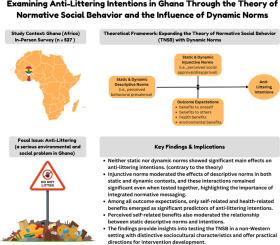通过规范社会行为理论和动态规范的影响来考察加纳的反乱扔垃圾意图
IF 2.2
Current research in ecological and social psychology
Pub Date : 2025-01-01
DOI:10.1016/j.cresp.2025.100236
引用次数: 0
摘要
本研究以规范社会行为理论(TNSB)为基础,基于对527名参与者的面对面调查,研究了对静态和动态规范以及多维结果预期的看法如何影响加纳的反乱扔垃圾意图。结果表明,静态规范和动态规范对行为意向均没有显著的主效应。相反,描述性规范和禁令性规范之间出现了显著的相互作用,无论是静态的还是动态的,突出了禁令性规范对描述性规范和意图之间关系的调节作用。在结果预期中,感知健康和自我相关利益是反乱丢垃圾意图的显著预测因子。此外,自我相关的结果预期调节了静态描述性规范和意图之间的关系。这些发现通过展示规范性影响如何在独特的社会文化环境中发挥作用,有助于在研究不足的非洲背景下测试TNSB。它们还表明,在某些情况下,如果环境宣传运动同时利用静态和动态的规范信息并强调个人和健康的好处,可能会更有效。本文章由计算机程序翻译,如有差异,请以英文原文为准。

Examining anti-littering intentions in Ghana through the theory of normative social behavior and the influence of dynamic norms
Grounded in the Theory of Normative Social Behavior (TNSB), this study examined how perceptions of static and dynamic norms and multidimensional outcome expectations influence anti-littering intentions in Ghana, based on in-person surveys with 527 participants. Results showed that neither static nor dynamic norms exerted significant main effects on behavioral intentions. Instead, significant interactions emerged between descriptive and injunctive norms, both static and dynamic, highlighting the moderating effects of injunctive norms on the relationship between descriptive norms and intentions. Among outcome expectations, perceived health and self-related benefits were significant predictors of anti-littering intentions. Additionally, self-related outcome expectations moderated the relationship between static descriptive norms and intentions. These findings contribute to testing the TNSB in an understudied African context by demonstrating how normative influences operate in a distinctive sociocultural setting. They also suggest that, in certain contexts, environmental communication campaigns may be more effective when they leverage both static and dynamic normative messages and emphasize personal and health benefits.
求助全文
通过发布文献求助,成功后即可免费获取论文全文。
去求助
来源期刊

Current research in ecological and social psychology
Social Psychology
CiteScore
1.70
自引率
0.00%
发文量
0
审稿时长
140 days
 求助内容:
求助内容: 应助结果提醒方式:
应助结果提醒方式:


